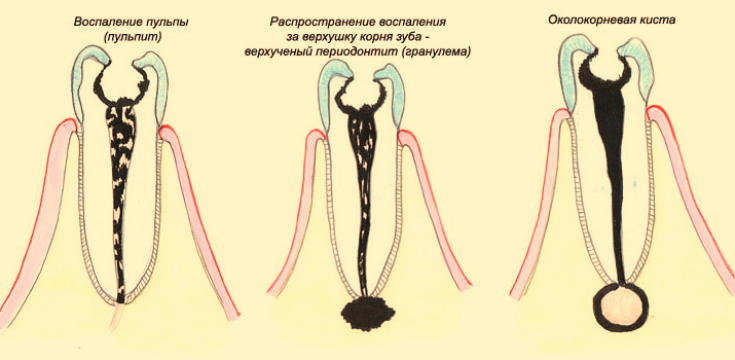Inflammation of the root of the tooth — a problem that dentists consider one of the most difficult. This condition requires a carefully thought-out approach to treatment, and the prognosis depends on the chosen direction of therapy: whether it will be possible to save the tooth or whether it will be necessary to resort to its removal.
But many will be interested to know that under the generally accepted term "root inflammation" lies a whole group of pathologies, and each of them has its own causes and treatment methods.
- For what causes inflammation of the tooth root
- Treatment of inflammation of the tooth root: in a timely manner — means effective
For what reasons does inflammation of the tooth root develop
The actual root of the tooth is a hollow "tube"; from cement and enamel, tapering towards the end. Accordingly, inflammation cannot develop in such tissues. But the root serves as a receptacle for the neurovascular bundle (pulp), which is located in the root canals from the inside, and outside the root is surrounded by soft tissues. And it is from the outside and from the inside of the root that an inflammatory process can occur. In in most cases, inflammation is caused by infections and irritation of soft tissues that develop under the following circumstances:
-
Advanced caries. For the development of pulpitis (inflammation of the pulp), it is not necessary that the destruction of the tooth reaches the neurovascular bundle. It is enough that between the pulp chamber and "outside world" a thin septum remained, which is no longer able to isolate the pulp from thermal irritants. Each time, upon contact with heat or cold during a meal, the pulp is exposed to irritating factors, which can provoke its inflammation. After the destruction of this thin wall, pathogenic microorganisms enter the game, which penetrate into the pulp from the carious cavity.
Read also: Arsenic in tooth: proven classic or hidden threat

-
Tooth injuries. In this case, inflammation can develop both in the pulp and in the peri-root tissues. In the first case, the infection penetrates into the pulp through damage in the crown of the tooth. In the second case, inflammation often develops when the ligaments of the tooth are torn, when a fracture is impacted, or when the periradicular tissues are injured by fragments of the root.
-
Complications of pulpitis. With a long course of pulpitis, the infection penetrates through the outlet openings of the root canals into the surrounding tissues. This can lead to periodontitis, the formation of a periodontal abscess, cyst or granuloma and the development of inflammation, purulent infection or neoplasm.
-
Medical error. Most dental procedures are performed blindly, and even the most qualified and experienced doctor can make a mistake. Among the most common — insufficient cleaning of the root canal before sealing it; and perforation of the root canal wall. Such situations are united by the fact that signs of inflammation develop 1-2 days after visiting the doctor, which immediately indicates the most likely cause of the problem.
But, regardless of the cause of root inflammation, it is important to treat it. Otherwise, the need for tooth extraction — only a matter of time.
Read also: How does caries form: when teeth are in danger
Treatment of inflammation of the tooth root: in a timely manner — means effective
In the treatment of inflammatory processes in the roots of the tooth, three directions are used:
-
Removal of the cause of inflammation. Depending on the revealed circumstances, the doctor may unfill the root canals for their re-treatment, remove the infected pulp and put a medicinal paste in the root canals or apply other means aimed at to eliminate the cause of the inflammation.
-
Treatment of inflammation and its complications. In some cases, conservative methods may not be sufficient and surgical intervention may be required. This is necessary when opening an abscess, removing a cyst or granuloma. But in all cases, anti-inflammatory, antibacterial, nootropic or other therapy (or a combination of several of them) with the help of drugs is carried out.

-
Relief of symptoms. Pain during inflammation of the roots of the tooth can greatly complicate life and worsen overall health. To alleviate this symptom, the doctor prescribes a short-term pain medication. Usually, after a properly performed treatment, 2-3 days of taking analgesics or NSAIDs is enough so that the pain does not return.
It is important to know that ignoring root inflammation inevitably leads to the need to extract the tooth. In addition, such consequences of inflammation as an abscess and phlegmon can lead to severe complications, since the infection quickly spreads through the bloodstream and periosteum. A cyst or granuloma, left untreated, leads to a melting of the jaw bone, which entails an increased risk of fractures.
Read also: Removal of a tooth cyst: features of the treatment of the disease
You might be interested in: How to place a filling.






Add a comment